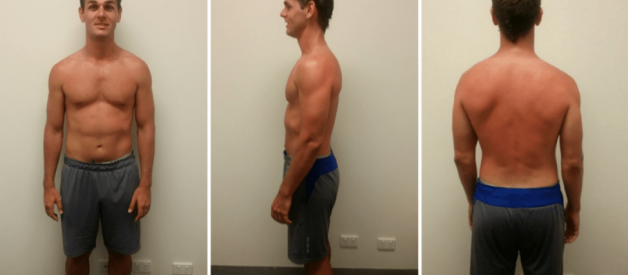Written by Brad Newton
In Google search: ?The best shoulder workout routine? (Enter)
How to get bigger deltoids? Why are my shoulders so small?
These are some of the questions I asked Google back in 2014 when I started my fitness journey. There is no doubt that well-developed and rounded shoulders (or ?delts?) are one of the key features to a powerful looking physique.
I can vividly remember how I felt not having much development anywhere ? especially my shoulders.
Check out these embarrassing set of photos taken on the 10th of Feb 2015.
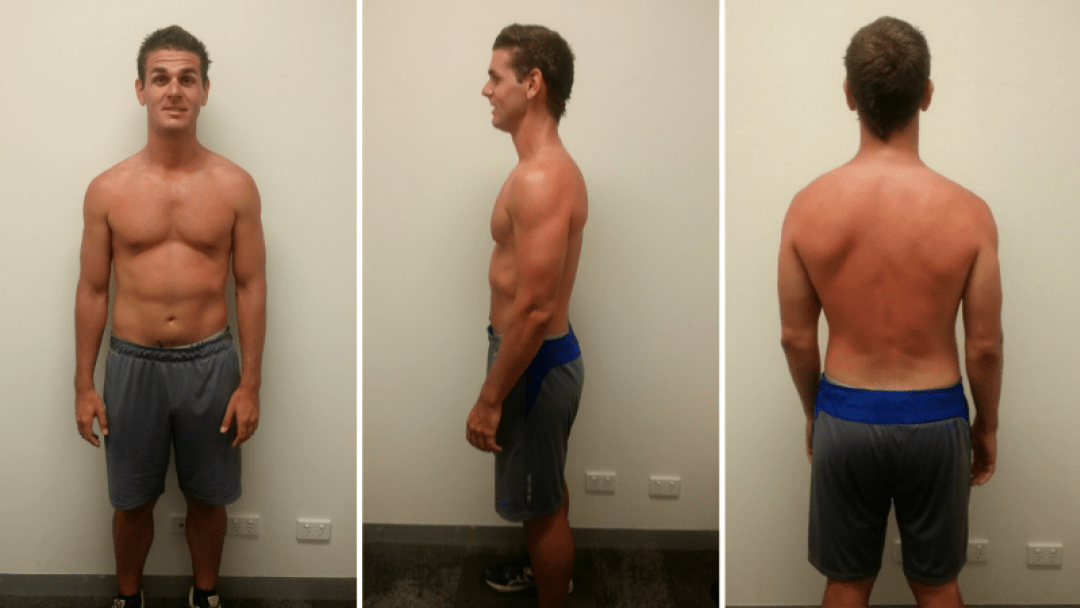
It wasn?t until I started implementing the advice I give in this article that I saw an explosive growth in my deltoids.
Specifically, when I started implementing the Overhead Shoulder Press or ?Military Press? into my routine, I noticed a remarkable increase in the size and strength of my deltoids.
Here is a front and back shot of me after I went through one heck of a body transformation (with my deltoids shaded for illustration purposes).
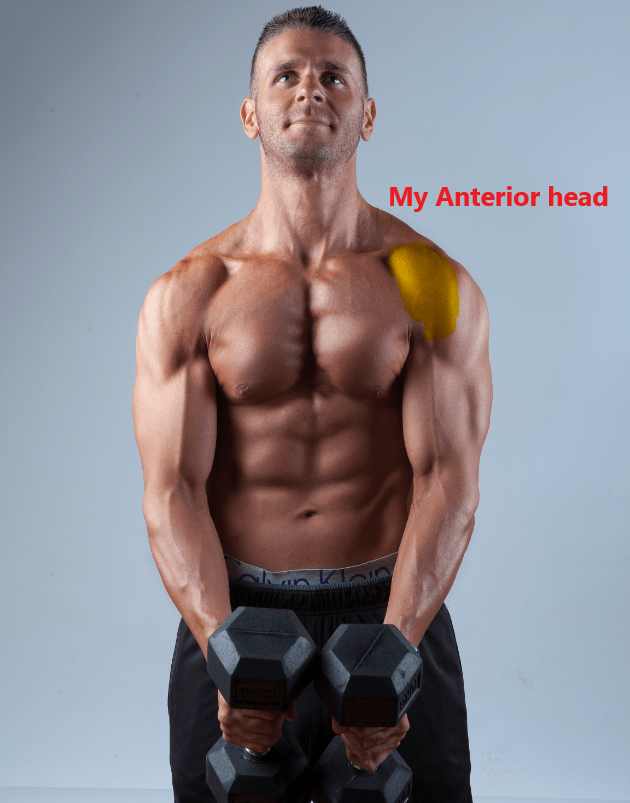
Below is a photo of my posterior (rear) and medial (middle) deltoids, which is much harder to build but, in this article, I will show you exactly what to do.
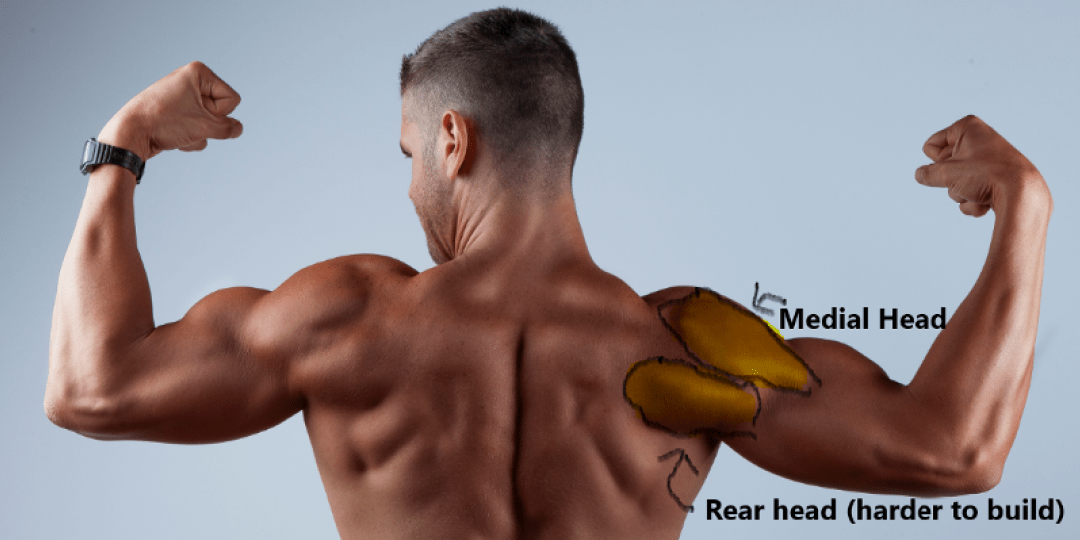
Let?s dig into the best shoulder workout routine if you are a beginner weightlifter.
Shoulder Workout Routine Basic Anatomy
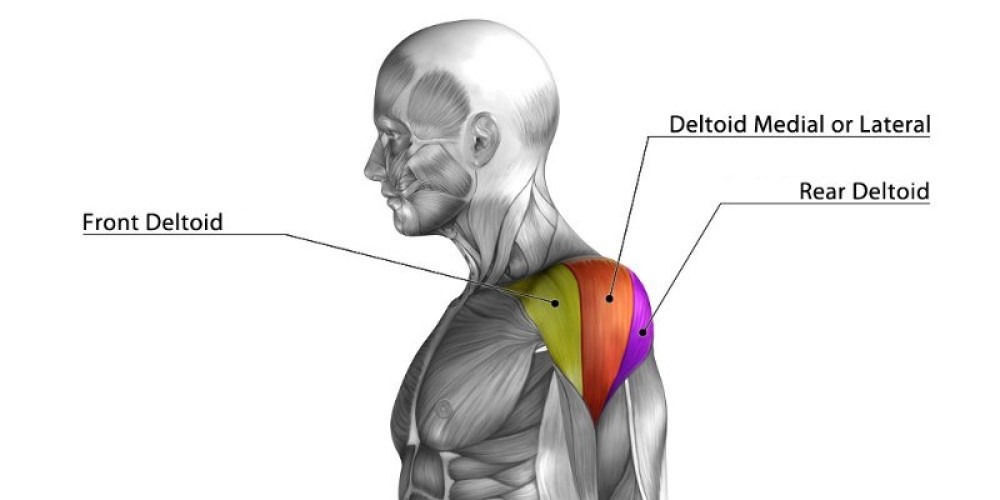
Before I share with you the best exercises for your shoulder workout routine, let?s tick off some basic anatomy so you are clear on the muscles you are actually training.
Your shoulders are comprised of three major muscles or ?heads? known as deltoids ? the anterior (front), medial (middle), and posterior (rear) deltoids.
The exercises I will share with you in this article will emphasise one or more heads over the other heads.
Some exercises will be isolation exercises which will target one specific head more than others.
Essentially, to achieve a perfectly ?rounded? shoulder, it is important to train all three heads ? with the posterior deltoid being the most stubborn to build.
My Shoulder Workout Routine
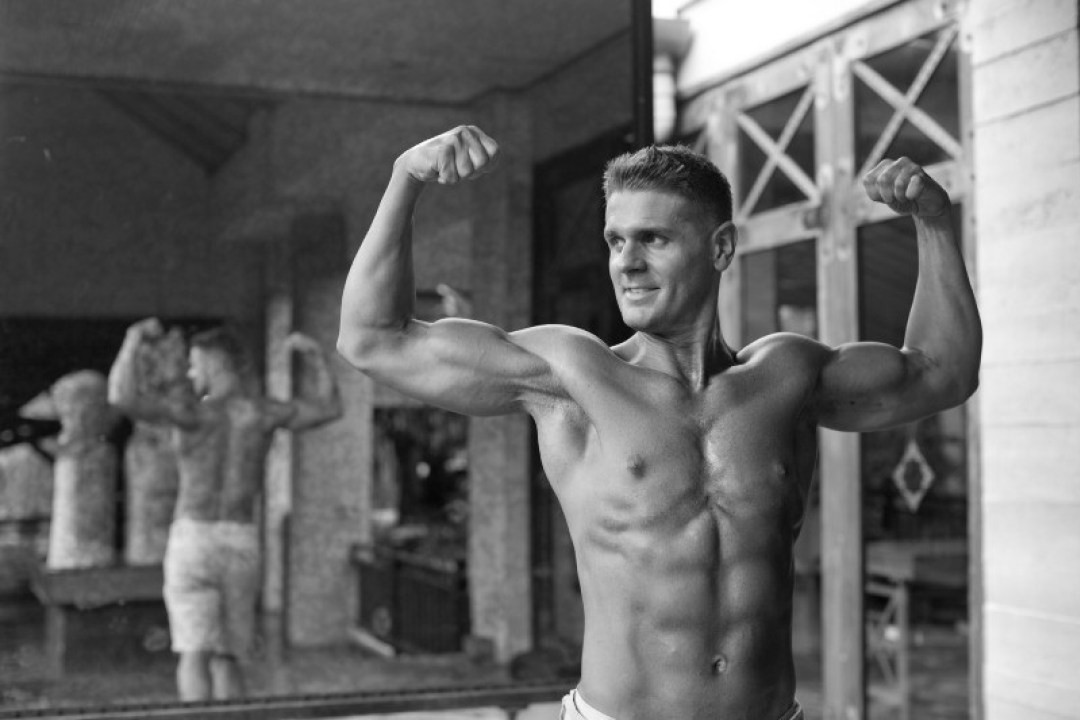
The simple (but not easy) strategy that I followed to transform my shoulders back in 2015, without steroids, is as follows;
- Focus on heavy compound shoulder exercises
- Training shoulders 1?2 times per week using the push-pull-legs training method.
- Training all three heads (front, middle, and rear)
- Emphasise progressive overload
- Setting calorie and macronutrient targets
- Patience!
Let?s take a closer look at each of these points.
Focus on Heavy Compound Shoulder Exercises
This realisation was a game-changer for me.
Prior to 2015, my focus was higher rep isolation workouts in the 15+ rep range, for as many sets as I could do (until failure!)
When I started emphasising heavy compound lifting in the lower rep range at 70?80% of my 1RM (one-rep max), I noticed a remarkable increase in both deltoid size and strength.
This equates to adding enough weight to each set where I would achieve around 6?8 reps (70%) per set.
Additionally, I started every shoulder workout routine with a compound exercise, or exercise involving multiple joints such as the Overhead Press or Arnold Press, and ?finished off? with 1?2 isolation exercises for my shoulders.
Training Shoulders 1?2 Times Per Week
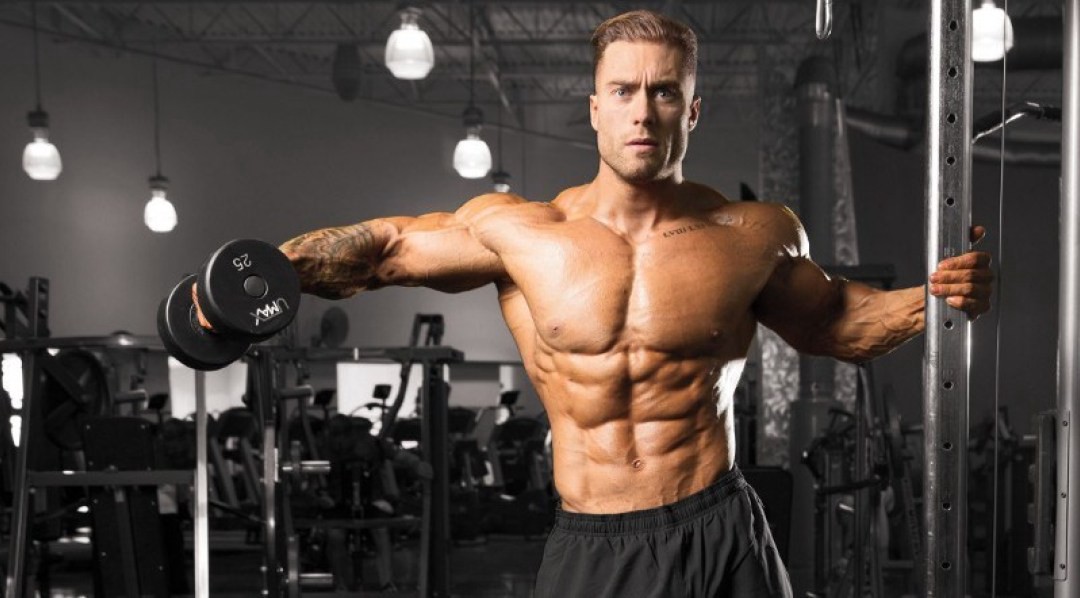
According to the literature, workout frequency is not an important factor for determining muscle and strength gains.
In other words, training your shoulders five times per week is not necessarily conducive for greater muscle gain then training them once or twice per week with correct volume.
What matters the most is the total weekly training volume of your deltoids ? or the total number of sets you do each and every week.
According to two scientific research papers, optimal weekly training volume is between 9 to 15 sets at 70?80% 1RM.
In other words, if you want to build great shoulders then you must aim to achieve a weekly workout volume of 9 to 15 sets.
It doesn?t matter if you choose to do all 15 sets on ?shoulder day? on Monday, or choose to spread your weekly volume across several days of the week.
According to the science, the end result will be the same.
To be honest, I really struggled to build my shoulders at 15 sets per week. If you are one of those guys with sub-par genetics (like me), try increasing your volume to 25?30 sets per week and split it across two non-consecutive days of the week.
Personally, I trained my shoulders twice per week, with a total of 10?12 sets per workout. My weekly training volume for a shoulder workout routine was around 20?25 sets. As you can see, it worked for me.
Training all three heads (front, middle, and rear)
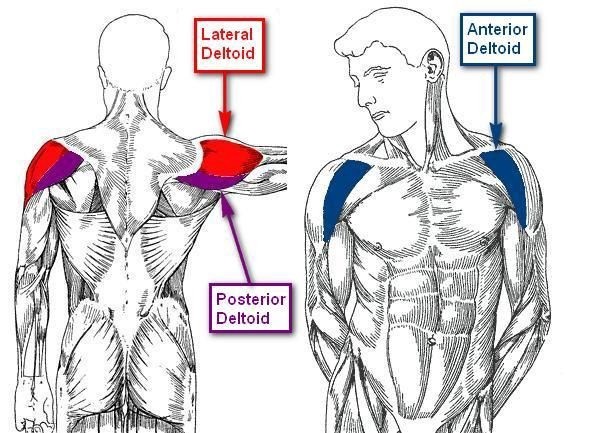
I always ensure that my shoulder workout routine consist of at least two exercises that specifically target the rear deltoid (the smallest and most stubborn muscle).
Your front deltoids usually cop a beating from flat and incline bench pressing on ?chest day?- which no guy on the planet ever skips!
It is worth mentioning that incorporating incline bench press in your routine (on chest day) will serve to activate more of the anterior (front) deltoid.
Later in this article, my sample workout plans will ensure that your rear deltoids are being adequately targeted.
Emphasise Progressive Overload
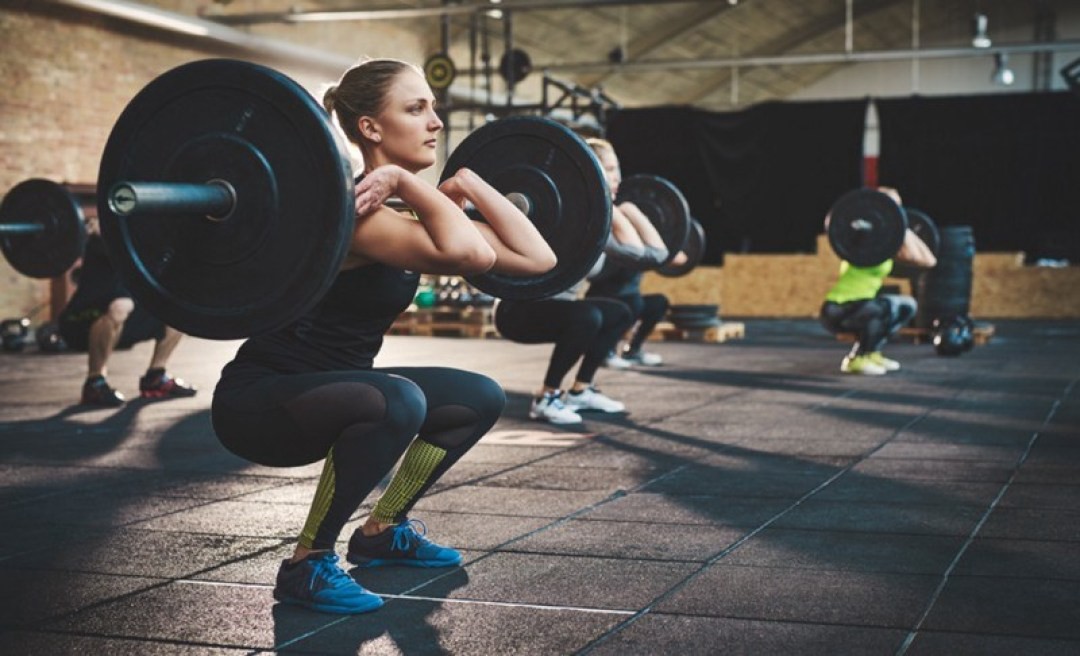
As I?ve mentioned in other articles, the most important pathway to building muscle is ?progressive overload?. Irrespective of the exercise type, if you are not undertaking progressive overload, you will not build any muscle. Period.
This is how I achieve progressive overload in my workouts.
Once I reach the top of my rep range for one set, I add 5?10 pounds of weight to the exercise. This will cause a small drop in the number of reps in the following set.
The aim of the game is to strive to lift slightly more weight on a particular exercise from the session or week before.
In order for your shoulder muscles to grow ? or any muscle for that matter ? you must force them to grow by making them work harder. Muscle growth is not achieved by ?pump? workouts or trying to work-up a sweat!
For example, once I reach 8 reps with 90 pounds on the Overhead Press in the first set ? I would add 5 pound plates to either side of the bar (10 pounds total) for the following set.
In the following set, if I am able to do only 6 reps for 100 pounds then this will be my new weight until I reach 8 reps again. Once I reach the upper end of the rep range, I will add extra weight. Rinse and repeat.
If I add the extra weight but can only lift 4 or 5 reps, then I?ve added too much weight and will only add 2.5 pounds to each side of the bar ? as opposed to 5 pounds either side.
Sometimes you might need to stick to a specific weight for several shoulder sessions in a row and achieve several sets at the top of the rep range, before adding more weight.
That?s progressive overload.
Setting Calorie and Macronutrient Targets
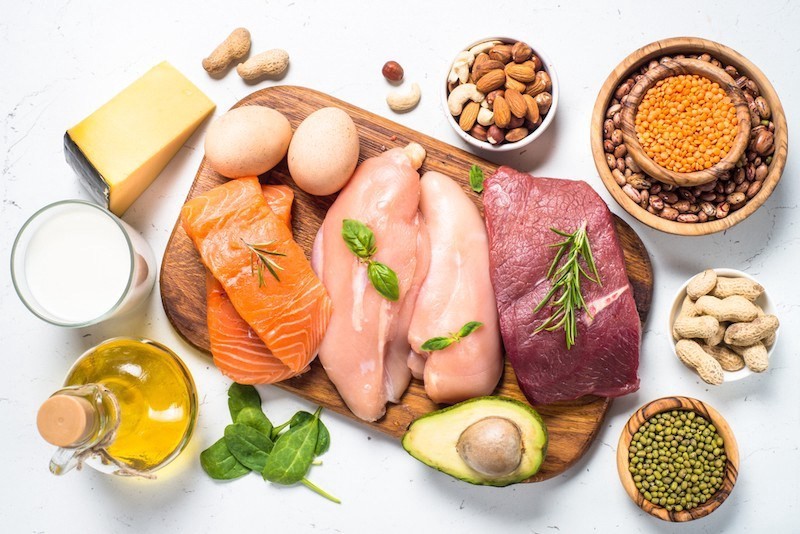
Every article on the best workout routine for shoulders is fundamentally flawed useless consideration is given to correct calorie and macronutrient intake.
And a high protein intake, day after day, is not the only ingredient to building great shoulders. Most people are not aware that overall calorie intake is also a major player!
In short, if you are not getting enough overall calories and protein on a daily basis ? you will be sorely disappointed by the end of the 6?8 week shoulder building program.
When I was building my shoulders out, I had setup my calories and macros on a bulking meal plan to maximise muscle and strength gains. After 8 weeks of bulking, I changed my macros and calories to reflect a cutting meal plan.
After cutting down to 10?12% body fat, I started to see more definition in my shoulders but I wanted to build them out more. So I decided to bulk and cut again, while following the exercise routine I share in this article.
There are no short cuts, special supplements, or hidden tricks. I am never going to try and sell you the red pill ? just the truth. It takes the right advice, hard work, and patience. But it is totally worth it ?
I have many fitness training courses (completely free), with thousands of reviews, that can also help.
The Best Shoulder Workout Routine Exercises
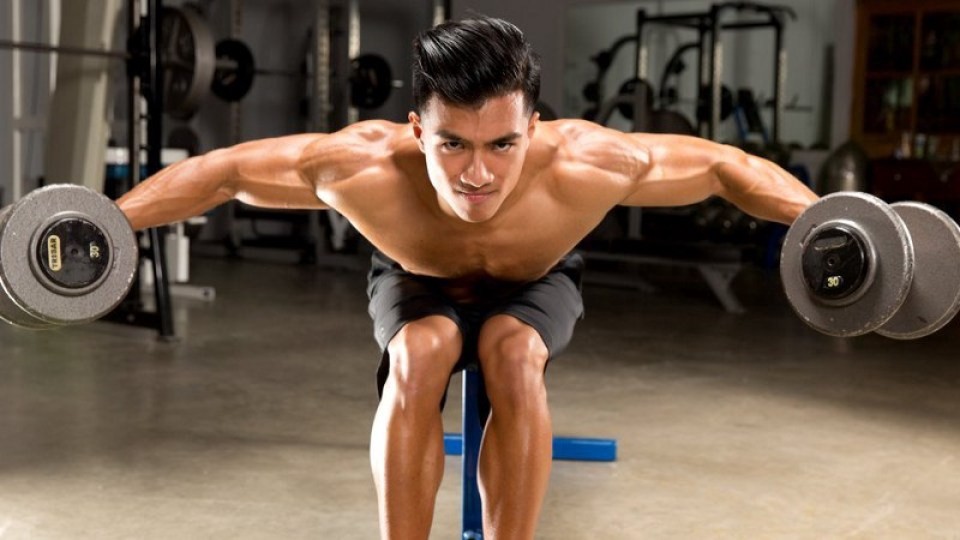
In this section, I will give you a list of shoulder exercises that are my personal favourite and have really helped me make progress in my fitness journey.
You should definitely incorporate some of these into your own shoulder workout.
1. Standing Overhead Press (Military Press)
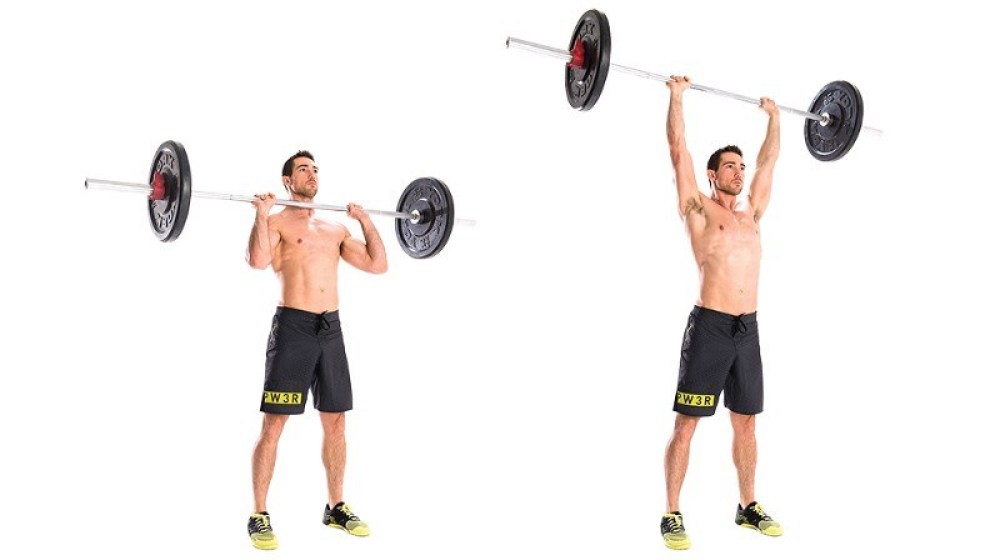
The standing barbell military press, or overhead press, is usually the first exercise I start with when I am training shoulders.
You can either start with standing or seated overhead press, with either dumbbells or barbells.
According to the literature, it was concluded that standing dumbbell (and barbell) overhead pressing, activated the deltoids more compared to when subjects were in a seated position.
There is no doubt that initiating the overhead press from the standing position will engage your entire core, making this variation much harder than if you are seated.
This is why I suggest alternating between seated and standing overhead press ? using either dumbbells or barbells ? and seeing what works best for you and your body.
How to: Standing Barbell Overhead Press (Military Press)
Check out this demonstration video by Scott Herman where he demonstrates this incredible exercise.
If you have never done this exercise before then I suggest practicing correct form and technique with an empty bar first ? ensuring you are always performing full range of motion!
One of the best demonstration videos I?ve ever seen is with Mark Rippetoe, one of the most respected strength training coaches in the industry.
Check out this demonstration video; How to Overhead Press with Mark Rippetoe.
I also suggest picking up a copy of his book Starting Strength. He?ll teach you everything you need to know about the four major lifts ? the deadlift, bench press, overhead press, and squat.
Some of the biggest mistakes people make is they do half reps and their wrists are not inline with their elbows. Also, it is extremely important to lock your core and that your feet are firmly planted on the ground.
I usually tell myself to pretend to push the bar through the ceiling. This mental queue is usually enough for me to achieve full range of motion.
How to: Seated Barbell Military Press
If you prefer to give your core and lower body a rest then give the seated variation of the overhead press a try!
Here is a demonstration video where Scott Herman explains the setup really well.
Again, I would suggest starting with an empty bar for several sessions to ensure correct form and technique.
It is also imperative to start building a training habit of emphasising full range of motion. Too many people fail to perform complete reps and it ruins their potential. Don?t make the same mistake.
How to: Standing Dumbbell Military Press
The third variation of the overhead press that I also enjoy is the standing dumbbell military press.
Personally, I like to alternate between standing barbell and dumbbell, and seated barbell and dumbbell variations, every 4?6 weeks.
Try them all ?
Here is a 30-second demonstration video to help you get started.
Always start dumbbell shoulder press exercises with very light weight, before slowly adding weight once your form and technique has reached a decent standard.
How to: Seated Dumbbell Military Press
The last variation that I suggest trying is the seated variation of the dumbbell military press. Here is a great demonstration video by Scott Herman.
Again, start with very light weight before adding more weight to your dumbbells.
Scott?s 50 pound dumbbells in the video is too much for someone just starting their journey. Start with half of that, and see how you feel.
Like all dumbbell and barbell exercises, you should always start your weight training with 3?4 dynamic warm-up sets, before starting your working sets.
I?ll discuss the correct dynamic warm-up method later in the article.
Common Overhead Pressing Mistakes
Before we move on, I want to point out a few big mistakes that beginners make that stunts their progress when performing the overhead shoulder press.
To avoid building bad training habits, you should definitely be mindful and actively try to correct these errors before they are harder to undo years into your training.
In Jeremy Ethier?s video below, he picks out 5 common overhead pressing mistakes and how to correct them.
Check this out.
Here is a timestamp of the mistakes from his video:
Mistake 1 (Flaring Elbows): 0:51
Mistake 2 (Curved Bar Path): 2:06
Mistake 3 (Arched Back): 3:18
Mistake 4 (Bent Wrists): 5:49
Mistake 5 (Using Momentum): 6:32
Flared elbows and bent wrists are easy to fix, along with being conscious of not engaging a ?push press? movement to gain momentum in the press.
2. Arnold Dumbbell Press
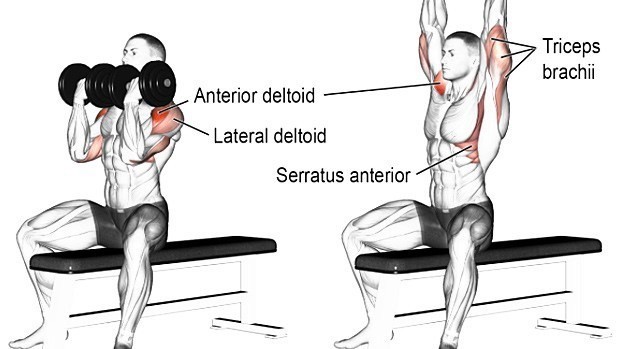
Another exercise that helped me build my anterior and medial heads of my shoulder was the Arnold press ? named after the man himself ?
This exercise was one of Arnold?s favourite exercises and played a huge role in the development of Arnold?s mega delts (and steroids, of course!)
The rotational nature of this exercise over other shoulder exercises means a greater range of motion will be achieved, leading to a greater degree of muscle fibre breakdown and repair.
Here is a demonstration video by Buff Dudes to give you an idea of the movement. Arnold?s rule: Don?t lock the elbows!
Like always, start with light weight first to learn a slow and controlled rotation through the movement. Don?t let the dumbbells drop uncontrollably. Emphasise slow and steady rotation.
This exercise is outstanding for working your anterior and medial head. I usually do this exercise after the overhead press.
3. Dumbbell Side Lateral Raise
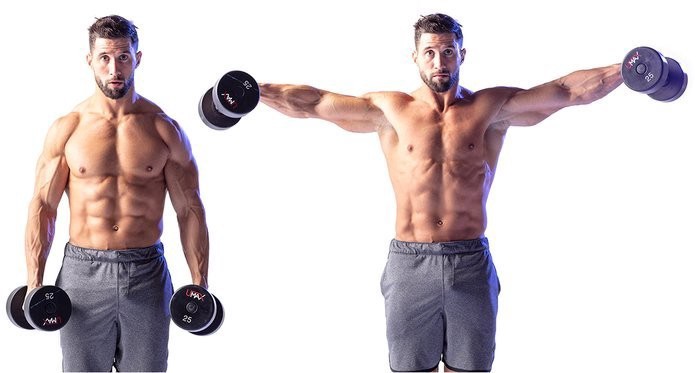
This exercise is important for targeting the medial or middle head of your deltoids.
It is completely up to you if you choose to sit down on a bench or stand up to undertake the side lateral raise.
Personally, I like standing up because it forces me to engage my core while I undertake the movement. I also usually include this exercise in my routine after I?ve completed the Overhead Press and Arnold Press.
Here is a demonstration video by Scott Herman.
A short and sweet video ?
Personally, I like to start with the dumbbells either side of my body.
It is important to mention that you should always emphasise slow and controlled movement through the range of motion.
Start with light weights first! If you are not able to achieve slow and controlled movement then your weight is too heavy and you must decrease it. Sometimes progress is made only by reducing the weight!
4. One-Arm Side Lateral Raise
When you increase the dumbbell weight of a side lateral raise (previous exercise), it can get challenging to lift both dumbbells simultaneously.
This is where you can do a one-arm side lateral raise variation. This allows you to continue targeting the medial head at a heavier weight, without compromising form.
If you are not sure how to execute this variation, check out the following demonstration video by T Nation.
Pretty straight forward, eh?
Personally, I only revert to a single-arm lateral raise if I am planning to lift heavy dumbbells targeting the middle head of the shoulder.
5. Alternating Dumbbell Front Raise
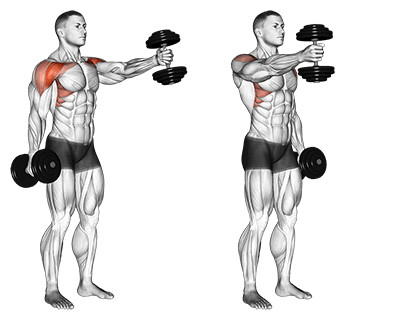
This is one of my favourite shoulder exercises for targeting the anterior (front) and medial (side) head of the shoulder.
You can also experiment with different variations of this exercise which will also target the anterior and medial heads; such as a front barbell raise and front plate raise. The choice is yours ?
In the following video, Scott Herman demonstrates the dumbbell front raise.
That?s enough targeting of the anterior and medial heads of the shoulder.
It?s time to consider exercises that will target the smaller and more stubborn posterior (rear) deltoid.
You should include at least 1?2 of these exercises in every shoulder workout routine. You won?t regret it.
6. Bent-over Dumbbell Raise
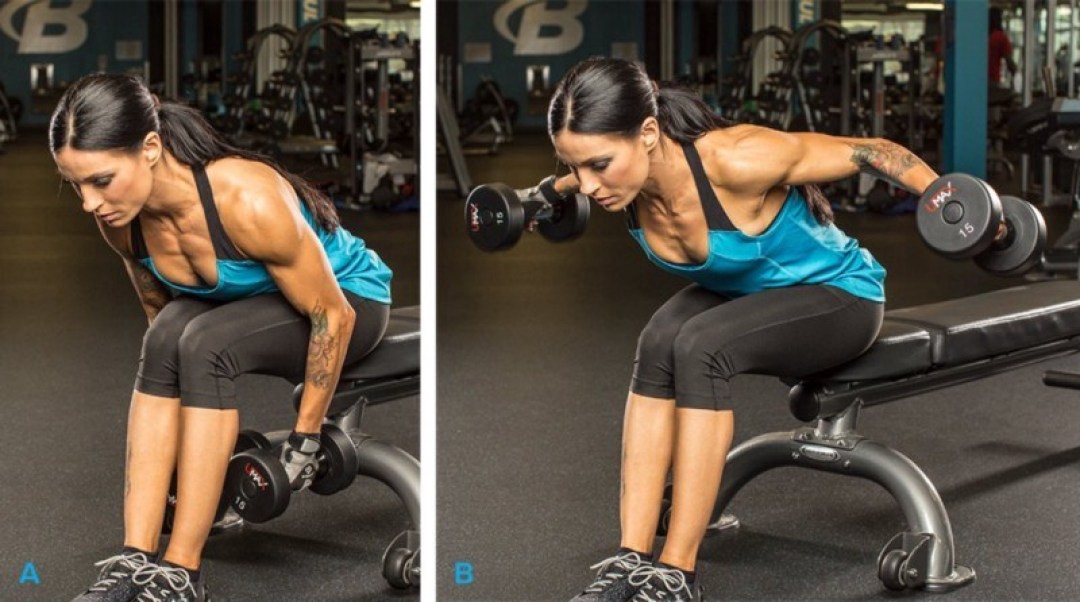
One of the biggest reasons why my posterior (rear) deltoid is not as big as they should be is due to neglecting them in the weight room early in my fitness journey.
Back in 2014, I only focused on executing shoulder exercises that targeted the anterior and medial heads but not the posterior (rear) head.
Of the three heads of the shoulders, the rear deltoid is the smallest and weakest (and very stubborn!).
They need to be trained directly.
It wasn?t until I incorporated exercises like the bent-over dumbbell raise in every shoulder workout, that I saw remarkable ?rounding? in my shoulders at the rear. Check out this demonstration video by Instructional Fitness.
Some people prefer to not use a bench as an aid and would rather bend over from the standing position. The choice is yours.
Here is a demonstration video by Scott to help you execute this movement from the standing position.
7. Face Pull
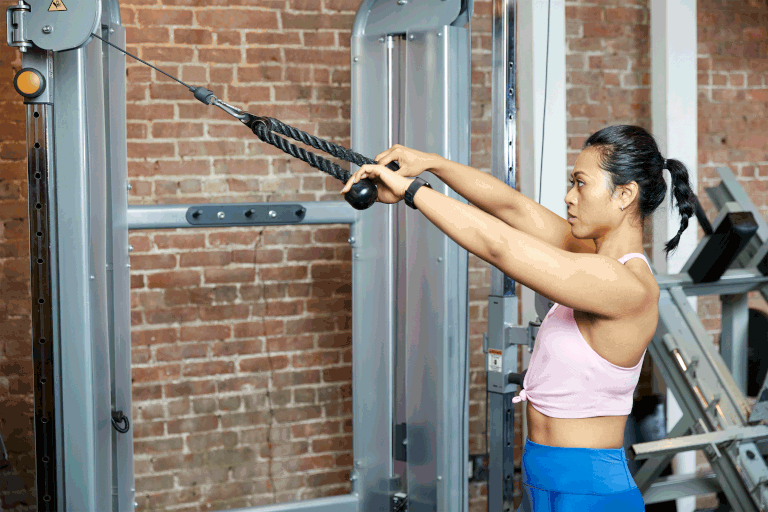
The face pull definitely contributed to the growth of my stubborn rear deltoid. I highly recommend incorporating them into your shoulder workout routine.
As always, start with light weight and use a rope attached to the pulley with the pulley set at around shoulder height.
Make sure you get your form and technique right to prevent shoulder injury.
Check out this demonstration video.
Keep your elbows high throughout the entire movement.
Now that you have all of the shoulder exercises you need to build an impressive set of deltoids, let?s put it into a workout routine.
I suggest taking a screenshot or writing this down and taking it with you to the gym.
My Favourite Shoulder Workout Routine
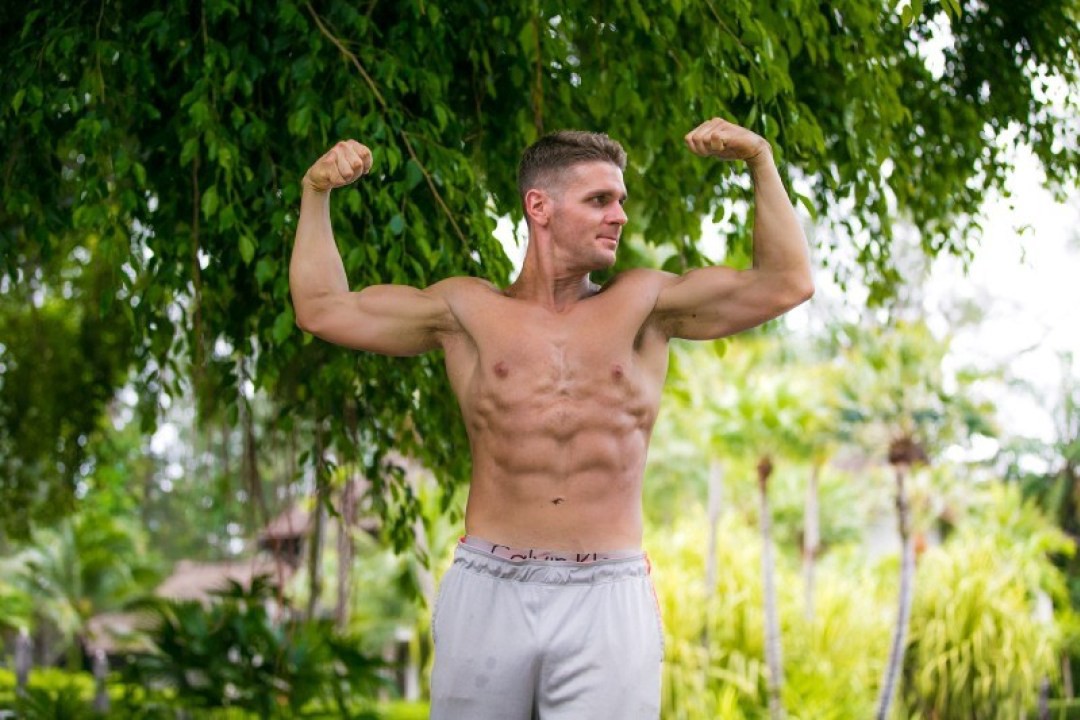
Below is a simple yet very effective shoulder-building workout which I suggest you do 1?2 times per week for the next 6?8 weeks.
If you want, you can incorporate this workout into a push-pull-legs routine that trains your entire body, and perfect for the absolute beginner.
After 6?8 weeks of doing these exercises and being on a bulk meal plan; start a cutting meal plan to reveal your new deltoid muscle definition ?
Most people usually need to do several bulk/cut cycles to achieve the deltoid definition they are after.
Important point
If you are incorporating a ?chest day? into your weekly routine, you will also be training your deltoids to some extent.
I suggest separating your ?chest day? and ?shoulder day? by at least 24 hours.
You could train your chest and shoulders in the same session!
Before starting your shoulder session, start with 3 warm-up sets, 10?12 reps each, at 50% of your working weight, before the first exercise on the list.
Here we go:
Barbell or Dumbbell Overhead Press (Seated or Standing)
3?4 sets of 6?8 reps
Arnold Press
3?4 sets of 6?8 reps
Bent-over Dumbbell Raise
3 sets of 8?10 reps
Face Pull
3 sets of 8?10 reps
You can change the order of these exercises or incorporate different variations ? especially if you start to plateau. As mentioned, you have the choice to work with dumbbells or barbells, either seated or standing.
You?ll notice that I?ve dropped in Bent-over Dumbbell Raises and Face Pulls which will specifically target the rear deltoid.
The most important shoulder exercise that you should get good at is the Military (or Overhead) Press. Spend the next 6?8 weeks to become better at executing this powerful movement pattern.
The aim is to keep progressing on each of the exercises ? rather than just ?running the motions? ? lifting slightly more weight than the week before.
What Supplements Should I Take?
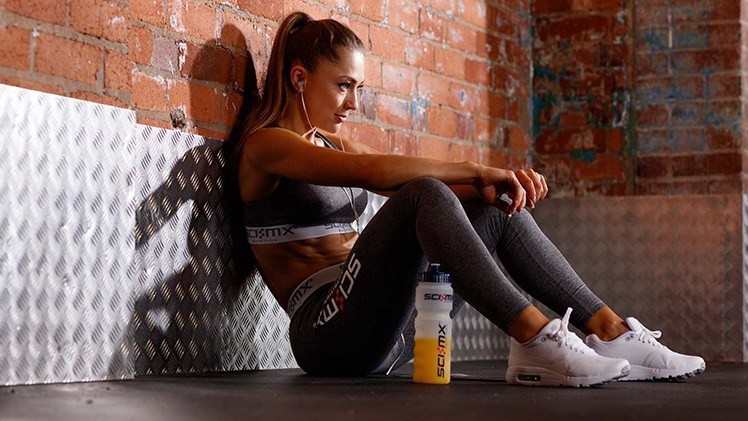
The short answer is? you don?t need to take supplements, provided you have correctly structured your diet and training.
If I were a sponsored athlete, it would be the perfect place in the article to offer discount coupons and a BS rant on the product I was trying to sell.
Most supplement companies produce supplements filled with junk ingredients, proprietary blends, and alluring packaging, to convince you to spend your hard-earned cash.
So while there are no workout supplements that can directly help you build great shoulders, there are two supplements that I?ve consistently taken over the years to assist in meeting my training goals.
Protein powder
Creatine monohydrate
Personally, I am a busy guy that struggles to get all of my protein needs from whole food (i.e., chicken, beef, seafood).
Taking whey protein powder to meet my daily intake requirement has been essential in my workout recovery.
Secondly, creatine monohydrate is the most researched supplement in the sports supplement world. It?s found naturally in the body and in food like red meat.
Hundreds of studies on supplementing with creatine have determined that it will help you build muscle and strength, improve anaerobic endurance, and reduce muscle soreness and damage.
Therefore, if you have good kidney function then I highly recommend that you supplement with creatine monohydrate. Ignore all other variants of creatine as almost all scientific studies have been conducted on creatine monohydrate.
It?s safe, cheap and very effective.
Shoulder Workout Routine Final Thoughts
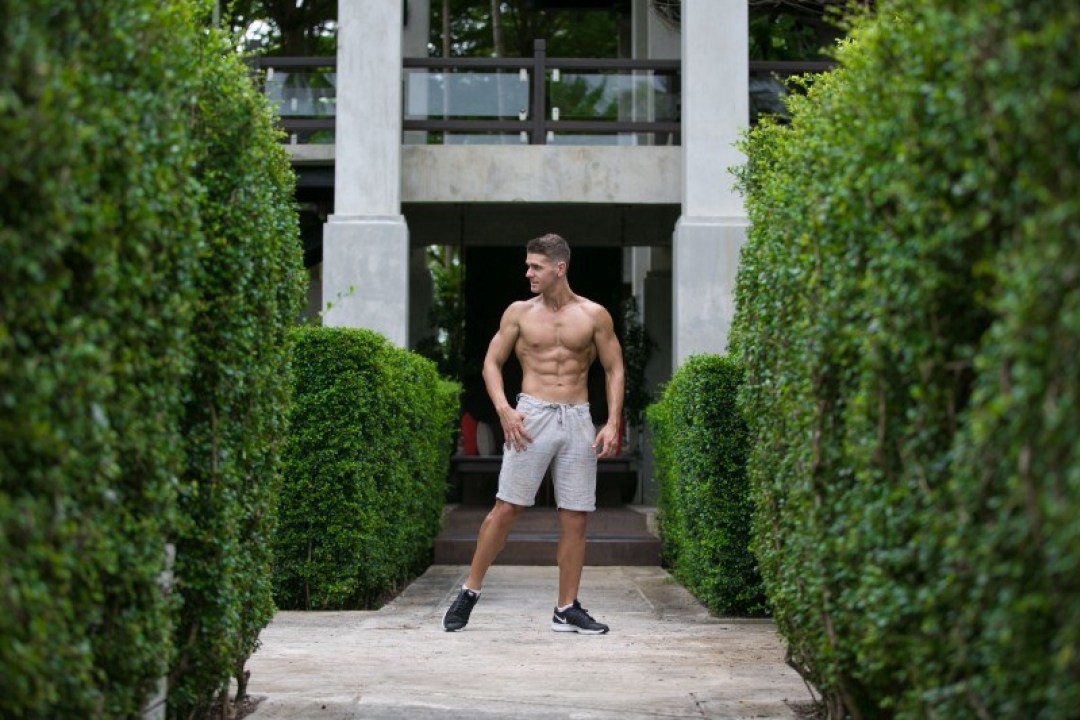
Building a great set of deltoids is not as complicated as most gurus would have you believe.
If you dedicate your time to implementing the strategies I used to build my own shoulders, then you?ll eventually be rewarded for your efforts. It is totally worth the grind ?
Let?s recap:
- Undertake heavy compound shoulder exercises
- ?Shoulder day? will be 1?2 times per week and can be used alongside the push-pull-legs training method.
- Your exercise selection must target all three heads (don?t forget the rear!)
- Aim to lift slightly more weight than the session before (progressive overload)
- Set up your calorie and macronutrient targets (I used these meal plans)
- Patience!
And you?ll build your own shoulder workout routine from the following shoulder exercises:
- Overhead Press
- Arnold Press
- Dumbbell Side Lateral Raise
- One-Arm Side Lateral Raise
- Alternating Dumbbell Front Raise
- Front plate raise
- Front barbell raise
- Bent-over Dumbbell Raise
- Face Pull
Once again, get good at the overhead press!
Personally, I like to use FitNotes to track my workouts. I?ve been using it for years and it helps ensure that I am progressively overloading my muscles each and every time.
Before I step into the gym, I will take a quick look at my previous ?shoulder day? to see what weight I lifted for any given number of reps and sets.
I?ll aim to lift slightly more weight or try and push an extra 1?2 reps! It can be a fight for those extra reps sometimes ? The growth is always in the fight.
Lastly, if you want to take your fitness transformation to another level, check out my free fitness training videos.
If you found this article useful, please click the ?clap? icon as it helps other people find it. For any questions, you can ask me on my website, Instagram, or my vlog.
Originally published at https://www.bradnewton.tv on August 3, 2019.
